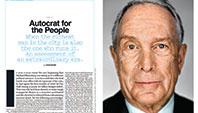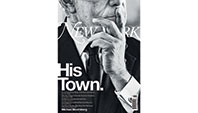
1. In a special issue devoted to the extraordinary twelve-year mayoralty of Michael Bloomberg, one particular detail got an especially explosive reaction—the mayor’s description, in a wide-ranging conversation with Chris Smith, of Bill de Blasio’s mayoral campaign as “racist” (“In Conversation: Michael Bloomberg,” September 16). The interview was published online just a few days before the primary, and De Blasio responded immediately: “I hope the mayor will reconsider what he said. I hope he realizes it was inappropriate.” The remark prompted commentary on the mayor’s relationship to the city’s less privileged from a wide range of sources, from The Wall Street Journal to the Washington Post, that seized the opportunity of our billionaire mayor sticking his foot in his mouth to reflect on the peculiar politics of the post-bailout “recovery” era. (Members of De Blasio’s campaign compared the interview to Mitt Romney’s “47 percent” comments, and Quinn supporters credited the gaffe with helping push De Blasio over the 40 percent threshold needed to avoid a runoff.) “Too bad Mr. Bloomberg can’t see racism where it persists: in the city’s abusive stop-and-frisk police tactics. Or hear the tone-deafness in his withering criticism of Mr. De Blasio’s populist campaign, which laments the growing divide between New York’s ‘two cities,’ rich and poor,” wrote the New York Times’ editorial board. “If only it were as simple as making the city as attractive as possible for people with money, so wealth rolls down the mountaintop. The benefits of oligarchy are harder to see when your eyes are inches from a wall as a cop pats you down for the gun you don’t have.” But in an op-ed published in the newspaper the same day, Frank Bruni was more sympathetic to Mayor Mike. “Is it any wonder that De Blasio has gotten under the mayor’s skin? It’s a narrative of either-or, of winner-loser, of one group’s blessings explaining and in some ways causing another group’s deprivations. The truth is less callous and more complicated than that,” he wrote. “To look at his signature initiatives and see only an upper-class agenda is selective, reductive, lazy,” he wrote. “While more passion about the gap between rich and poor is a virtuous thing, making Bloomberg the heavy isn’t.” At Salon, David Sirota argued that the criticism of Bloomberg was legitimate—and not just on the question of his racial tone-deafness. “New York City is the most economically unequal city in one of the most unequal states in one of the most unequal countries in the industrialized world. And Bloomberg’s personal class war has only made that situation worse,” he wrote. “He’s been an ideologically motivated plutocrat who has diligently worked in New York to comfort the comfortable and afflict the afflicted. The predictable result is that Bloomberg’s mayoral tenure has coincided with an epic rise in inequality and destitution, to the point where almost half of all New York City residents live at or near the poverty line. From a social-engineering perspective, that has no doubt served the mayor’s goal. He has at once made it better than ever to be rich and more painful than ever to be poor—a reality that no doubt makes New York more attractive to the rich.”

2. “It’s a weird thing that apology is actually the politics of personal destruction,” theater monologuist Mike Daisey told Carl Swanson, reflecting on the scathing episode of “This American Life” about Apple’s production practices he’d made a hit with NPR’s Apple-loving audience, only to see it retracted over factual problems (“Mike Daisey’s Big Story,” September 16). In the aftermath of that retraction, Daisey made few friends by taking an ambivalent position—apologizing for his falsehoods but arguing that theater might serve a higher investigative purpose than journalism—and he quickly jumped into the comments section of this article in a similarly imperious manner. “I don’t know why the author has chosen the interpretation that I have no remorse,” Daisey wrote. “Eighteen months ago, one week after everything went down, I posted my full public apology. For what it’s worth, having followed the situation very closely for all this time, the scandal did not provide much fodder for Apple apologists—they tried to use it, but the amount of damning information coming from Foxconn and other manufacturers in China is overwhelming.” Mostly, though, Daisey engaged other readers on nymag.com—mainly on the subject of whether he should be commenting at all. To a reader who wondered what his behavior said about him, Daisey responded, “It says I’m a normal human being”; to the suggestion that it might be more appropriate to stand aside, he replied, “I had no idea there were this many rules to writing comments on the internet. ;)”; and to the proposal he comment instead under a pseudonym, he wrote, “Honestly, and I mean no disrespect, but I think people who won’t stand behind their words are cowards. I think it’s why these rat warrens are so vicious.” “It is time to let go of the idea that you can control the way we all perceive you,” wrote one commenter. “Does this truly make you feel better at the end of the day? If therapy will help you, go for it instead of hashing this stuff out with anonymous commenters like me.” A more sympathetic commenter argued, “I think it’s impressive that Daisey bothers to come on piddly little comment boards like this and spar with trolls. It’s nearly impossible for public figures to voice or defend their opinions without being edited and packaged to fit an editor’s preplanned agenda.”
Send correspondence to: nym.letters@nymag.com